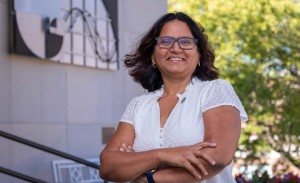Assistant professor Anamika Prasad is making history—she is the first Department of Mechanical Engineering faculty member to receive the prestigious National Science Foundation CAREER award. The five-year, $531,740 grant will support basic science research using plants as an inspiration for designing and developing flexible composite materials. 
“This award is a strong validation of the ideas I developed at SDSU where I identified an exciting opportunity to apply my fundamental engineering knowledge toward promoting the region’s biobased economy and workforce,” said Prasad. Her materials research lab applies engineering tools to study a range of materials from plants and bones to metallic alloys and emerging material systems.
Before coming to SDSU in 2016, Prasad’s research focused on the structure and mechanics of bone and cardiovascular tissue and related biomedical devices in collaboration with medical doctors. To develop research relevant to South Dakota’s agriculture-based economy and to SDSU’s land-grant mission, the materials scientist began exploring fast-growing plants, such as sunflowers, from an engineering perspective.
“Translating knowledge from the human cardiovascular system to water conductive tissue in plants and from bone to plant stem structures has been an exhilarating process,” said Prasad, who earned her Ph.D. in material science and engineering from the Massachusetts Institute of Technology and did postdoctoral research in bioengineering at Stanford University.
Recognizing innovative research
“On a professional front, receiving the CAREER award opens a whole set of opportunities for my lab and students and for my department and college,” she said.
Mechanical engineering department head Yucheng Liu, the Duane Sander Endowed Professor in Engineering Innovation and Entrepreneurship, said, “This is a milestone for the department to fulfill the commitment to fundamental research directed toward transformative advances in materials science and insightful knowledge in bioinspired composites.”
Associate dean for engineering research Rajesh Kavasseri said, “It’s very heartening to see Dr. Prasad’s patient pursuit of bold research earn national recognition. She has established a fundamentally innovative research program in biomaterials and biocomposites that is certain to spawn many more interesting discoveries and elevate the research profile of our college.”
Developing bioinspired composites
For composite materials, balancing multiple—and many times conflicting—requirements is one of the biggest challenges going forward, Prasad said. “Traditional polymers (which are typically used in everyday composites) while providing strength and manufacturability are not sustainable long term—they end up as waste and do not break down in the environment. We need to figure out ways to improve this by developing biobased materials that decompose under certain conditions. At the same time, we need materials that can address structural demands and environmental stability.”






